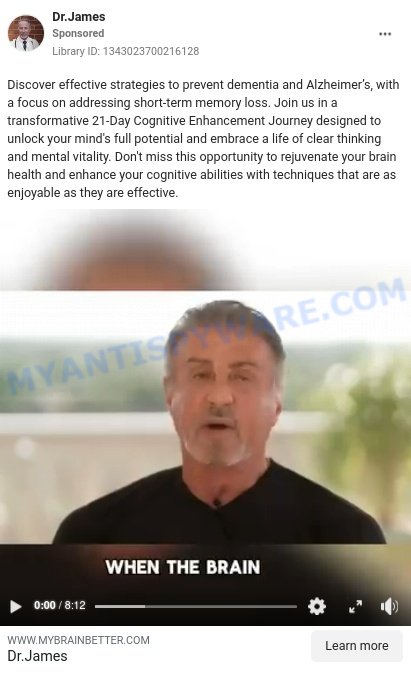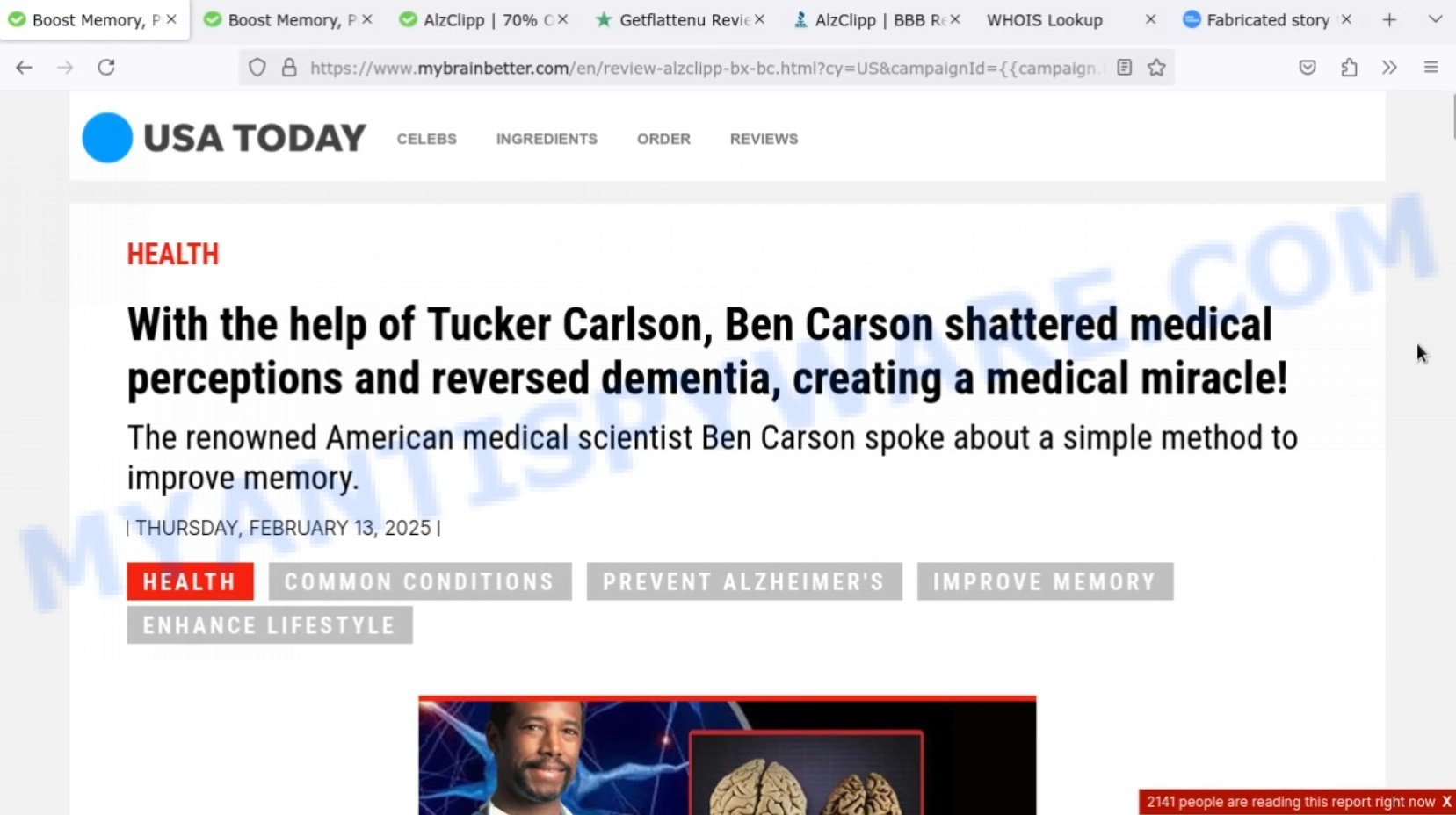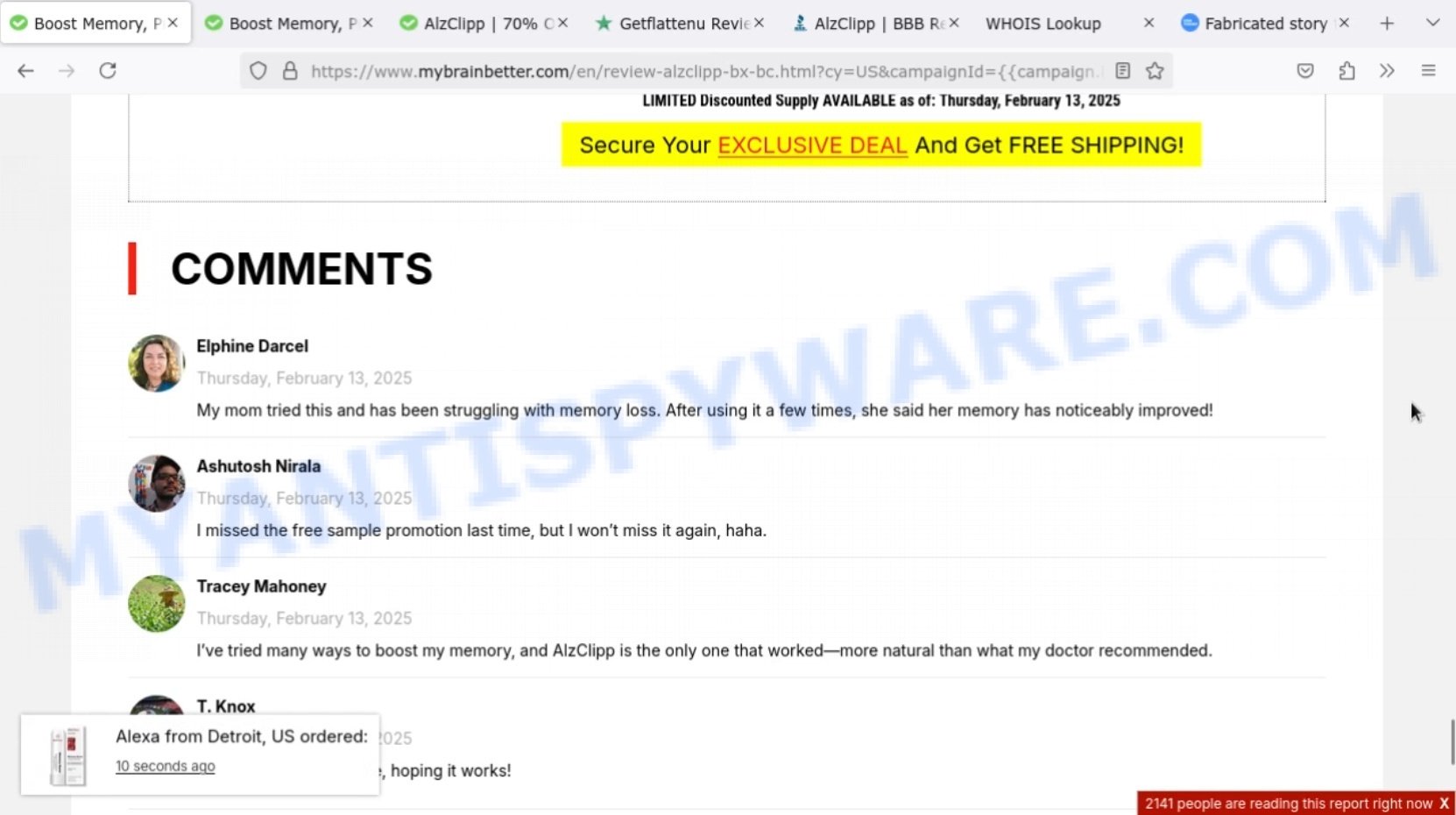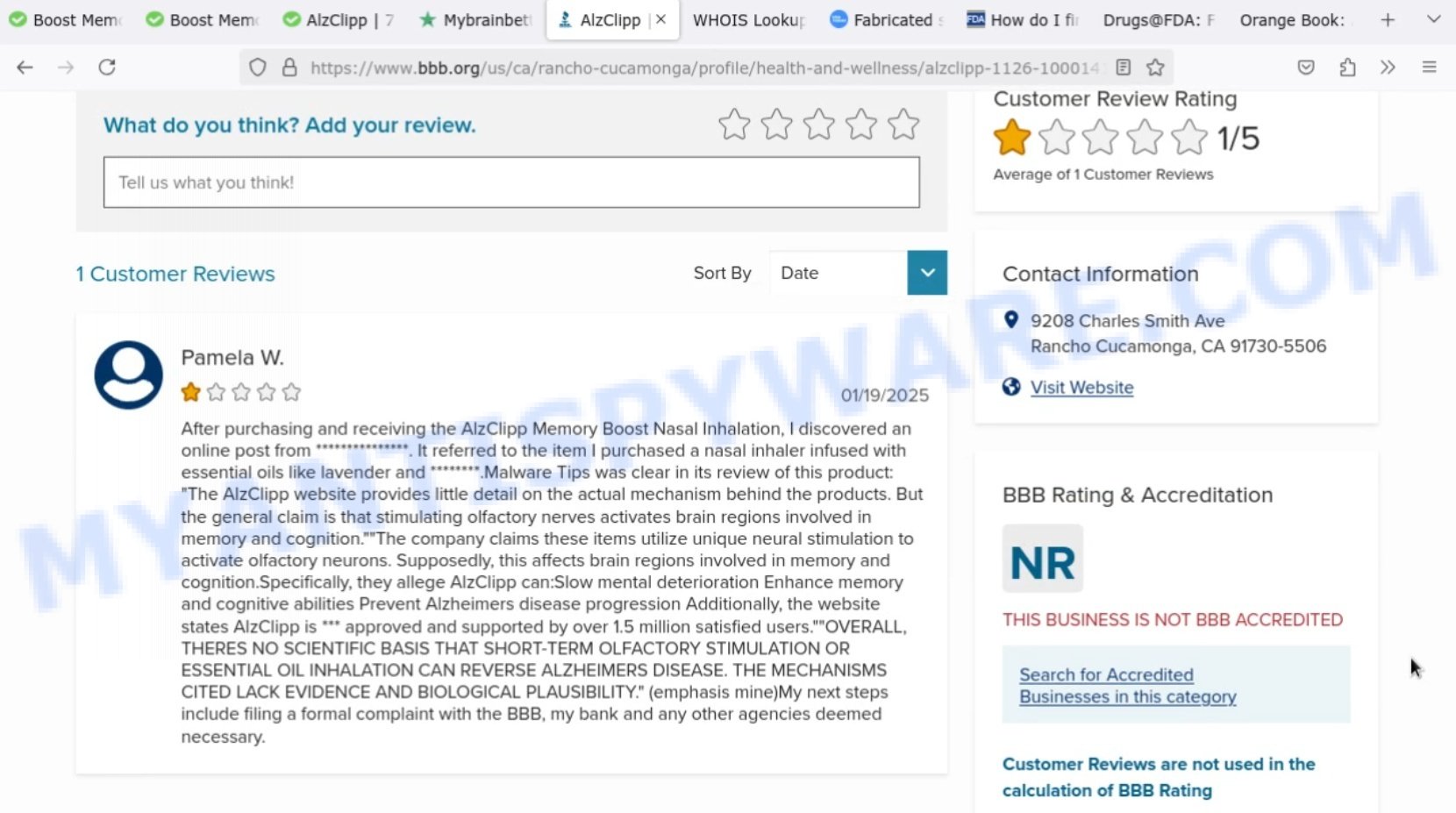Scammers are aggressively promoting AlzClipp, a brain health and memory support inhaler that raises many red flags. This product is widely advertised online, including on social media, using deceptive tactics to lure customers. The marketing for AlzClipp is full of false promises and misleading practices.
The promoters behind AlzClipp use fake endorsements, including deepfake videos featuring public figures like Sylvester Stallone and supposed endorsements from Dr. Ben Carson, claiming miraculous improvements in Alzheimer’s symptoms. However, a simple online search reveals no evidence to support these claims. The ads boast miraculous recoveries and unbelievable discounts, yet there is no credible research backing these assertions.
In addition, the product’s website displays flashy badges such as “FDA APPROVED”, and “MADE IN THE USA”, yet independent sources like Trustpilot show no genuine reviews. Scam sites also use deceptive page designs that mimic credible news sources, initially presenting themselves as informational articles only to later push for immediate purchases, with fake testimonials appearing only in these phony contexts.
If you’re considering buying AlzClipp, think twice. It is crucial to consult a healthcare professional before trying any supplement, especially when it is marketed with unrealistic claims and fraudulent endorsements. Real health solutions should be based on sound medical advice, not deceptive online ads.
Table of Contents
🚨 Is AlzClipp a Scam?
AlzClipp is being promoted with deceptive tactics aimed at tricking people looking for help with memory and Alzheimer’s disease management. These tactics are common among scammers who prey on individuals with serious health concerns.
Key Red Flags:
- 🌐 Fake Celebrity Endorsements: AlzClipp uses manipulated deepfake videos featuring high-profile figures such as Sylvester Stallone and purported endorsements by medical professionals like Dr. Ben Carson. Their endorsements and claims about reversing Alzheimer’s disease and enhancing memory are entirely fabricated and have no basis in reality.
- ⭐ Fabricated Testimonials and Reviews: The product is promoted through phony articles that mimic reputable news outlets like USA TODAY. These articles end with glowing testimonials that cannot be verified on the official website or independent platforms like Trustpilot, indicating that the reviews are likely invented.
- 🔒 Misleading Website Claims: The official site flaunts claims such as “FDA approved” and “clinically proven” which are misleading because there is no FDA approval for the stated uses, and the claims of clinical proof lack verification and transparency.
- ⚠️ Exaggerated Health Claims: Promotional materials claim that AlzClipp can completely reverse dementia and improve cognitive health within days. These claims are not backed by solid scientific evidence and may lead consumers to forego proper medical treatment.
- 📉 Poor Website Quality and Questionable Redirects: Clicking on AlzClipp ads often leads to other domains with high-pressure sales tactics and dubious claims, typical of scam sites designed to confuse and mislead consumers.
- 👤 Misleading Use of Deepfake Technology: The promotional videos employ deepfake technology to create fake endorsements, giving the illusion of credible experts vouching for AlzClipp. These manipulated visuals are solely intended to build false trust.
- 🔗 Dubious Purchase Links and Pressuring Sales Tactics: After promotional content, sudden discount offers appear—advertising significant price drops and limited availability to pressure consumers into a hurried purchase without thorough consideration.
In summary, the numerous red flags surrounding AlzClipp suggest that it is part of a scam designed to deceive consumers. The use of deepfake endorsements, fabricated testimonials, exaggerated health claims, misleading website claims, questionable redirect tactics, and pressuring sales methods all point to a product that is not a genuine health solution. It is strongly advised to avoid AlzClipp and seek advice from qualified healthcare professionals for safe and proven health solutions.
🕵️♂️ How the ‘AlzClipp’ Scam Operates
Scammers behind AlzClipp start by using targeted ads and sponsored posts on platforms like Facebook and Instagram. They publish misleading articles, fake testimonials, and use deceptive, celebrity-endorsed content to push their product into top search results while concealing any negative feedback. This approach attracts people who are seeking solutions for memory enhancement and Alzheimer’s prevention.

When users click on these ads, they are taken to fraudulent websites designed to look like legitimate health news outlets. These sites mimic logos, layouts, and writing styles of credible sources like USA TODAY, making visitors believe that AlzClipp is endorsed by reputable figures and organizations.

A common tactic is the use of fake expert endorsements. The scammers falsely claim that high-profile figures like Ben Carson and celebrities such as Reba McEntire and Clint Eastwood endorse AlzClipp. They even employ manipulated images and deepfake videos to create the impression that these well-known individuals are backing the product, lending it a false sense of legitimacy.

The scam websites often display an excessive number of trust logos and badges, such as “FDA Approved” and “Clinically Proven”, which are used to create a false sense of security. In reality, the FDA does not approve this type of product for the claims made, and there is no actual evidence provided to back the product’s effectiveness.
Marketing materials use urgent phrases like “Limited Time Offer” and “Exclusive Deal Today” to pressure consumers into making hasty decisions without proper research. Promotions might promise significant discounts, emphasizing the scarcity of the product with statements like “Almost Gone” and “Claim Your Discounted Supply Now”.
Moreover, the only testimonials appear in the styled articles, featuring overly positive comments from supposed users. The official website itself lacks any genuine user reviews or a reliable feedback system, and independent platforms like Trustpilot also show no reviews.

After victims make a purchase, scammers often push extra sales with unrealistic discounts or free shipping offers. Many buyers later discover that they have been charged recurring fees without clear consent, and attempts to obtain refunds are typically unsuccessful, resulting in significant financial loss.

In summary, the AlzClipp scam uses misleading ads, fake expert endorsements, manipulated celebrity images, and fabricated reviews to trick consumers into buying a product with no scientific backing. Consumers ultimately find themselves deceived by exaggerated health claims and false promises.
🤔 Why Such Scams Are Possible
Quick Profit Motive
Scammers behind AlzClipp aim to earn money quickly by making unverified promises. They exaggerate benefits and use fake testimonials, including deepfake endorsements featuring figures like Sylvester Stallone and misrepresented medical experts, to lure customers before the scam is exposed.
Limited Oversight on Ad Platforms
Although social media and advertising platforms try to block fraudulent ads, they can’t catch them all. This allows misleading promotions for AlzClipp to slip through, reaching a wide audience of people desperate for simple health fixes and miracle solutions for memory enhancement and Alzheimer’s prevention.
🧠 Exploiting Human Psychology
The marketers behind AlzClipp know that many people are searching for a quick and easy solution for conditions like Alzheimer’s disease. By promising significant cognitive improvement and reversing dementia symptoms, they exploit consumers’ hopes and fears, making them overlook crucial details and warnings.
⚖️ Lack of Legal Consequences
These scams often involve complicated setups with fake endorsements, multiple redirect websites, and manipulated media. This complexity allows the operators behind AlzClipp to evade legal repercussions, as the layers of deception make it hard to hold anyone accountable.
👤 Anonymity on the Internet
Scammers use temporary domains and fake social media profiles, and deepfake videos to create a false sense of legitimacy around AlzClipp. This anonymity makes it difficult for authorities to track them down and stop their deceptive practices.
😱 What to Do If Scammed
If you find yourself ensnared by the AlzClipp Scam, immediate action is crucial. Here’s what you should consider doing:
🛑 Stop Further Transactions
The first step is to halt any additional transactions that might be in process. Contact your bank or credit card provider and inform them that you’ve fallen victim to a scam. They can help by blocking the card or reversing any unauthorized transactions.
📞 Report the Fraud
File a report with your local police and provide all the available evidence, such as screenshots, emails, and website URLs. Additionally, report the scam to online portals like the Better Business Bureau (BBB) at www.bbb.org or the Federal Trade Commission (FTC) at reportfraud.ftc.gov. If you’re in another country, reach out to your national consumer protection agency.
💻 Take Screenshots
Before the scam website gets taken down or changes, make sure to capture screenshots of your transactions and communications. These can serve as evidence if you decide to pursue legal action.
⚖️ Consult Legal Advice
Speak to a legal advisor about your situation. While pursuing legal action may be time-consuming and costly, it could be a possible avenue for recovering your lost money.
📢 Share Your Experience
Use social media platforms to share your experience and warn others about the scam. Your story could prevent someone else from falling victim to the same or similar scams.
Summary Table
| Factor | Observations | Impact on Legitimacy |
|---|---|---|
| Product Description | AlzClipp is marketed as a revolutionary Alzheimer’s and memory improvement inhaler, featuring dubious claims about celebrity endorsements and endorsements by medical professionals like Ben Carson. These claims lack credible scientific evidence and involve misleading use of deepfake technology. | Negative (Unsubstantiated health claims and deceptive promotional tactics) |
| Reviews | Testimonials appear in fake articles designed to mimic reputable sources such as USA TODAY. There are no verifiable reviews on independent platforms, and user feedback available is largely negative or non-existent. | Negative (Fabricated testimonials and absence of independent reviews) |
| Marketing Channels | Uses deceptive marketing practices including deepfake videos, and misleading claims of FDA approval and media endorsements to falsely establish credibility and exploit consumer trust. | Negative (Misleading marketing with fabricated media and endorsements) |
| Price | Promoted with aggressive marketing claiming significant discounts and limited-time offers to pressure consumers into making quick purchases without proper evaluation. | Negative (Pressure selling tactics and misleading pricing claims) |
| Real Functionality | Claims to enhance cognitive function and reverse symptoms of Alzheimer’s disease through olfactory stimulation, but provides no scientifically validated evidence to support these claims. | Negative (Unproven claims with no scientific backing) |
| Company Contacts | Company provides minimal contact information with no transparency. | Negative (Inadequate customer support and lack of company transparency) |
| Product Source | Claims of being “FDA approved” are false as the FDA does not approve these types of products. Such misleading claims are used to exploit consumer trust. | Negative (False advertising regarding product approval and source) |
| Safety Claims | While marketed as safe due to natural ingredients, there is no detailed information on the potential side effects or interactions, raising concerns about consumer safety. | Negative (Lack of comprehensive safety information and misleading safety claims) |
| Website Transparency | The website uses high-pressure sales tactics such as limited-time offers and manipulates visitor perception with fake urgency, such as limited stock warnings. The website’s registration is hidden, raising concerns about transparency. | Negative (Deceptive sales tactics and opaque website practices) |
| Refund Policy | Promotes a money-back guarantee, but customer feedback indicates difficulties in obtaining refunds, pointing to a possibly misleading refund policy. | Negative (Difficult refund process and deceptive policy communication) |
Conclusion
The AlzClipp brain health enhancer is a scam, relying on fake reviews, fabricated endorsements, and manipulated videos to create a misleading appearance of trustworthiness. The scammers behind AlzClipp use deepfake technology and false claims, including fake endorsements featuring figures like Ben Carson and manipulated statements attributed to celebrities like Sylvester Stallone, to lure potential buyers.
Instead of providing genuine benefits, consumers are misled by bogus testimonials and exaggerated health claims that promise miraculous improvements in memory and cognitive function. The website employs urgent language, deceptive mimicry of credible news sources, and false affiliations with organizations like the FDA—where the initially claimed approval turns out to be nonexistent—ensuring that customers are deceived into believing the product’s efficacy, with little to no real benefit.
Bottom Line: Avoid AlzClipp. Always verify any health product that makes unrealistic health claims, especially when the marketing relies on deceptive tactics, fraudulent endorsements, and manipulated videos.
Stay cautious and do your research; if an offer seems too good to be true or depends on fraudulent testimonials, it is most likely a scam.















